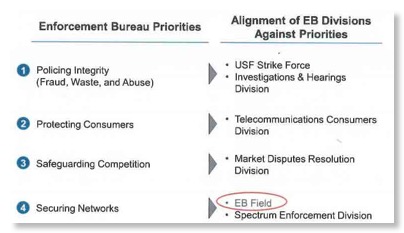Enforcement Bureau Too Aggressive?

Dave pointed out that prior to LeBlanc's arrival there had only been 5 enforcement actions greater than $5M none of which was over $25M, but that since he arrived at EB there have been another 5 over $5M and one of them involved $100M! Dave has been quoted as saying at the conference that FCC has become "much, much more aggressive on enforcement”.
Too aggressive on enforcement?
Let's note that these actions all deal with Title II issues. EB was created to manage all FCC's enforcement work and to give them rational priorities. This is a spectrum blog and so let's review what today's EB has been doing with technical spectrum policy enforcement. The field staff downsizing is an obvious feature. Although increased productivity has been promised, there is no sign of the equipment, travel, training, and overtime funding needed to make that happen.
The consultant's report that was leaked revealed EB's priorities:

From Sunset Park, Fri. at ~4:55pm, many of the usual suspects seemed to be off the air, but 91.3 & 95.9 were on, w/preaching in English. We were on a hill w/view of NJ skyline & could also hear an apparently NJ-based Haitian pirate at 102.1 FM, spaced awfully close to WFAN-FM. Around 5:30 p.m. Fri., some of the usual suspects like 90.9 and 91.7 started their broadcast day. Others like 89.3 & 89.7 were still dark. ...also 92.9, 94.3, 94.5, 95.1, 97.5, 97.7, 99.3, 99.7, 99.9, 101.5, 101.7, 102.1, 102.3, 103.1, 104.1, 107.1, 107.9, and possibly 104.7.
Note that spectrum and field issues are at the bottom of the list. The recent tweets below on pirate radio activity ion New York shows what results from such a low priority:
While your blogger was involved in 4 criminal prosecutions ( 2 satellite jamming, 1 air traffic control intrusion, and 1 maritime false distress) during his brief tour in EB's predecessor, the Field Operations Bureau, it is unclear if EB has ever been involved in a criminal Title III matter since its creation more than 20 years ago from the merger of both FOB and enforcement parts of other bureaus. While this is blamed on DOJ disinterest, one wonders what has changed so much since the creation of EB?
Note that when AT&T and Motorola were found to be involved in harmful interference to safety-related Terminal Doppler Weather Radars near airports that detect turbulence that can endanger aircraft, they got off with "voluntary payments" of $25k and $9k . (AT&T and Moto's legal fees for these matter surely dwarfed the pittance they paid for their guilt.!) While there have been several $100+k NALs for cellular jamming incidents, have anywhere near these amounts ever been paid by the guilty party? Have Chinese jammer manufacturers ever paid any of the $1M+ NALs issued to them? There are anecdotal reports that EB and the FCC bureaucracy have little attention span for collecting such NALs.
So maybe the problem is a misbalance of enforcement interest between Title II and Title III issues and too much of a focus on impressive press releases as opposed to actual compliance or even payment of penalties?
When FCC announced the downsizing of spectrum enforcement, CTIA, NAB, and APCO complained and managed to get promises that their specific enforcement areas would not be ignored, but the overall plan changed little other than these promises. There is little assurance that the remaining EB field staff will have access to equipment funding travel, and over time to do the job expected of them and promised to the 3 large associations.
The root cause of this downsizing was the FCC's desperate budget situation.
While Congress might not want FCC to have resources for controversial topics like "spectrum caps" and "net neutrality", perhaps the key trade associations should start exploring with OMB and appropriation committees some sort of "lock box" arrangement for basic FCC noncontroversial long term spectrum policy and enforcement funding for issues that have been bipartisan for decades?



![Validate my RSS feed [Valid RSS]](valid-rss-rogers.png)

